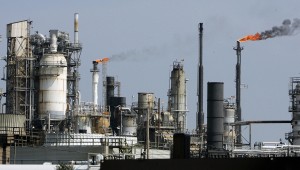Coming Soon to the TCEQ: Greenhouse Gas Permits?

An oil refinery in Texas City, Texas. A new bill could help streamline the greenhouse gas permitting process.
Update: HB 788, which would put greenhouse gas permitting into the hands of the Texas Commission on Environmental Quality (TCEQ), passed out of the House this week. No amendments to the bill were added. Mike Heim, a Texas oil and gas executive, previously told the House Natural Resources Committee that moving the permitting process to the TCEQ could bring millions of dollars to the state. Opponents said the bill strips the public’s power to contest a pollution permit. The bill now heads to the Senate Natural Resources Committee.
Time is money in the energy industry, and oil and natural gas executives say the Environmental Protection Agency, EPA, is wasting their time. In particular, they say the EPA takes too long to issue greenhouse gas permits.
Oil and gas executives testified Tuesday at a House Environmental Regulation Committee meeting in favor of a bill that could change that. The bill, HB 788, authored by Rep. Wayne Smith, R-Baytown, would have the Texas Commission on Environmental Quality, TCEQ, take over and streamline the greenhouse gas permitting process.
Mike Heim, President and Chief Operating Officer of Targa Resources and President of the Gas Processors Association, a natural gas trade association, testified in favor of the bill. He said the slow permitting process has affected his bottom line.
“If I had known it would have taken this long to get a permit, I probably would have gone to Louisiana and built my plant over there,” Heim said. “I’ve lost $90 million worth of revenue in a year waiting for this (permit) that I will never recoup.”
One of Heim’s permits is for a 100,000 barrel fractionator that would be built in Mont Belvieu just east of Houston. A fractionator is like a refinery for natural gas. It creates gasoline additives, propane and the building blocks for plastics, among other things.
Heim said there were more than 50 greenhouse gas permits waiting for EPA approval, those projects would cost an estimated $30 billion, he said.
A Brief History of Time (spent fighting over pollution regs)
Early in its first term, the Obama administration announced that greenhouse gas was a form of pollution that could be regulated by the EPA under the US Clean Air Act. The next year the EPA asked states if they would be able to regulate their own emissions by 2011. Texas officials, who had recently seen the state’s air permitting program at the TCEQ dissaproved by the EPA, replied angrily, refusing to create a state based regulatory framework.
Since then, Texas and the EPA have engaged in a series of legal actions around pollution permitting. In some cases lawsuits from Texas officials, many of whom avow skepticism of a link between Co2 and global climate change, questioned the legal rationale for regulating greenhouse gasses in the first place.In 2012 the EPA approved a new process, modeled after federal regulations, that would allow Texas to take over air permitting within the state again, excluding Co2.
Given that history, the move to bring greenhouse gas regulation back under the purview of the state of Texas could be seen as a victory for an environmental movement that has sought to highlight the dangers of Co2 gasses.
But some within that movement don’t believe the bill provides strong enough assurances that Texas regulators will take the job seriously.
Contested Cases
David Power, Deputy Director of Public Citizen, a watchdog group, said contested case hearings, which can be part of the EPA permitting process, should be included in the TCEQ’s process.
Contested case hearings allow citizens, such as a resident living near a soon-to-be-built fractionator ( or anything else that requires an environmental permit), to come forward, protest the permit and insert themselves into the bureaucratic process. Power told StateImpact that the bill would put an end to such hearings.
-State Rep. Wayne Smith.
If they’d keep contested case hearings, “we think that it would be a good bill.” Power said.
Rep. Smith said those hearings are exactly the type of process he’s trying to get rid of. Contested case hearings can string the permit process out a year or more.
“If we ended up doing this with contested case hearings we wouldn’t be achieving anything. We are trying to make the process more efficient,” Smith added.
In fact, a hearing before the State Senate Committee on Natural Resources taking place at the very same time, was considering doing away with contested cases at the TCEQ all together.
Cyrus Reed, Conservation Director with the Sierrra Club Lonestar Chapter, said the contested hearing cases should, in some way, remain. He suggested limiting their scope and duration.
Reed also said he was in favor of the bill.
“It’s time for Texas to move forward as well,” he added.


